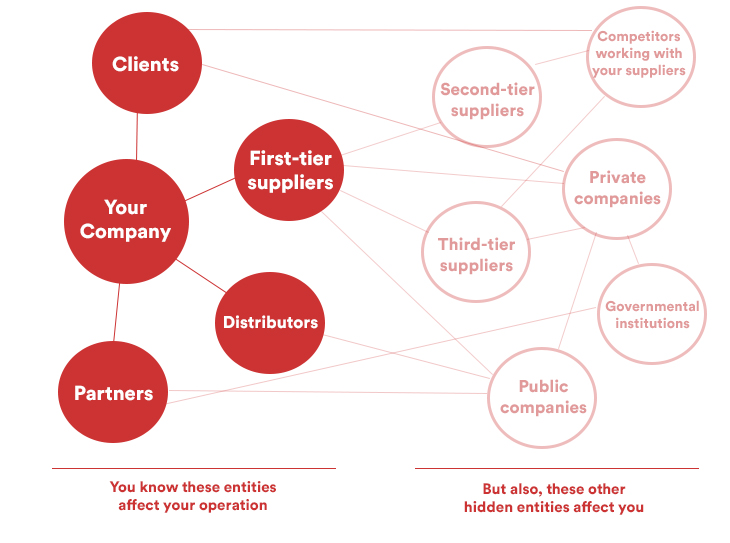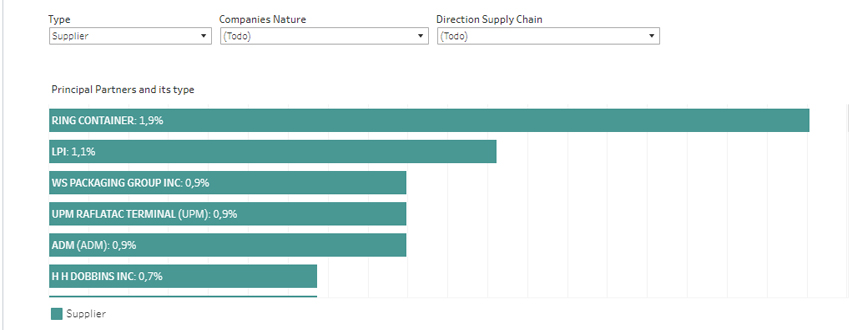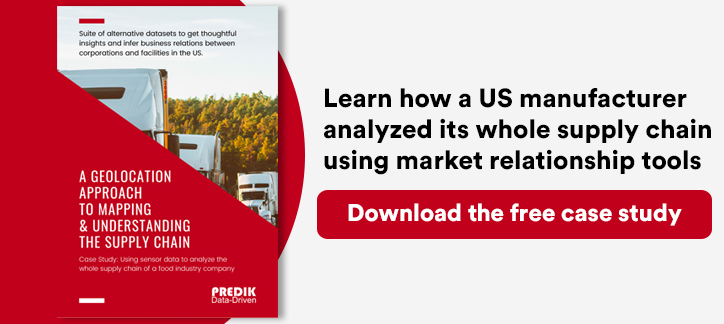How well do you know your clients? Surely, your marketing and sales teams know that the key to growing sales lies in understanding every detail of your user.
Another question for you: How well do you know your suppliers? And your distributors? Have you ever wondered if the supplier you have worked with for years also has business relations with a competitor? Do you know if a second-tier supplier could be affecting your operation?
You will be surprised to see how little you may know about your cross-company relationships.
Understanding your business connections
Your business relations are not limited to the suppliers, distributors, and partners you work with directly. You have way more connections, and each one affects you one way or another.

For example, a car assembler needs a tire supplier, which depends on a rubber supplier, and so on. If one of these elements doesn’t meet expectations, the whole production chain gets affected, and your client pays for this. That’s what’s been happening with the automotive industry since last year.
Understanding all the entities connected to your product lines, services, and processes lets you identify new business opportunities and risks. The more you dig into the different layers of your cross-company relations, the more you will understand the causes and effects in your business supply and operational chain.
Digging into your business relations can bring you some insights like:
- Are your suppliers’ relations with other companies a threat to you? Do you need to modify some policies?
- Are your current suppliers the best choice, or do you have other options?
- Which factors are affecting your prices?
- Which companies in your supply chain could generate problems in the future? Which ones are causing you trouble right now? How much is it costing you?
- Which business relations do you need to add, eliminate or modify to improve your customer experience and optimize your operations?
- What’s the best way to classify your different supply chain tiers?
- Are any companies you work with facing legal or financial issues? How will this affect you?

The importance of identifying business connections
Some companies will only need simple research to have a better picture. Others, especially bigger companies in complex markets, will need a deeper look to understand all their relations. The more connections you analyze and understand, the more tools you have to face internal problems and counteract competitive threats. Also, you will be able to identify external obstacles and take advantage of new market opportunities.

Do you know who’ll be the biggest beneficiary of all this? Your client. By uncovering relevant insights, you’ll be able to identify unfulfilled needs, users’ pain points related to your brand, and disguised complaints.
Using market and business relationships tools
Identifying hidden relations inside your business environment can be complicated and time-consuming. Some entities are not legally required to disclose any information, and others can be difficult to unravel.
Fortunately, Big Data and geolocation technology allow you to get powerful tools to identify, measure, and understand all your crossed-company relations, from your suppliers to your customers.

At PREDIK Data-Driven, we have developed market relationship tools with an exact methodology that allows us to:
1) Identify all the sources of information that are needed.
2) Evaluate and analyze each data piece from public and private entities involved with your business.
3) Determine correlations and patterns found between those entities.
4) Visualize and classify first, second, and third tiers relations.
Let us help you make better decisions through reliable and complete data. We have more than 14 years working with top companies like Adidas, Panasonic, Shell and Michellin.



